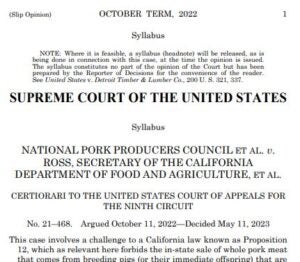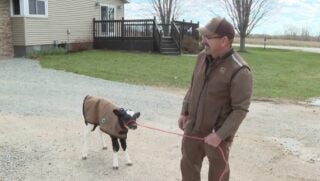Late last week, the Supreme Court of the United States released its opinion in the National Pork Producers Council v. Ross case based on California’s Prop 12. It’s one of the biggest agriculture-related cases in quite some time. Given the high court’s recent appointments, it was hard to anticipate how the court would rule on this case. Unfortunately, though maybe not surprisingly (am I too cynical now?), farmers didn’t win this round.
So what happened and how do we move forward? Luckily, dear reader, I read the entire 58-page opinion so I can help you make sense of it all.
Background
California voters approved Prop 12 in 2018. The law mandates certain housing requirements for veal, calves, breeding pigs, and egg-laying hens. In short, the law requires that farmers keep these animals in minimum-size housing, regardless of current practices or other considerations for good animal husbandry. If these products are sold in the state, then the farmers raising them have to comply — no matter where their farm is located.

The National Pork Producers Council and the American Farm Bureau Federation thought this law ran counter to the Dormant Commerce Clause. More specifically, one state can’t pass laws that burden producers across the entire country. Rather it can only impose regulatory burdens on its own citizens. This legal theory is a pretty old one, but not one that’s often invoked.
The two major ag organizations felt there was a decent shot they might be able to win this one, and so they decided to sue California. The case finally made its way to SCOTUS.
The Opinion
The first thing that sticks out to me is that the high court’s justices were all over the place. The opinion was broken into a number of parts, with the various judges teaming up to join, concur, or consent to each one. And contrary to what our mainstream media and politicians want you to think, there was no conservative side or liberal side; everyone was just jumbled up.
The other thing that’s immediately apparent is that Justice Neil Gorsuch, who drafted the court’s opinion, closes its introduction by stating, “[w]hile the Constitution addresses many weighty issues, the type of pork chops California merchants may sell is not on that list.” He also seemed to criticize NPPC and AFBF by suggesting the lawsuit was really about their “preferred way of doing business.”

The court’s opinion hinges on an analysis of whether the state law in question “discriminates” against out-of-state businesses. If so, then the law violates the Dormant Commerce Clause. If not, then it doesn’t matter and the inquiry is ended. For example, if California’s law placed a tax on any pork produced out of the state, then it’s unfairly discriminating against those producers.
It’s a very narrow reading of the Dormant Commerce Clause. Gorsuch seems quite eager to clarify that any other interpretation of the Dormant Commerce Clause’s applicability just isn’t feasible. He insists that the legal precedent always comes back to the question of discrimination, even when the cases say something different. And if NPPC and AFBF thought otherwise? Well, he argues, that’s just because they’re trying to read former SCOTUS opinions too closely.
This is, arguably, the most frustrating part about SCOTUS. Sometimes the justices’ opinions swear they’re adhering to legal precedent and it’s clear either they aren’t, or they’re twisting old cases in such a way to fit they’re current position. I guess that’s the practice of law, but the cockiness I read in this opinion is frustrating. That’s how we get gems like this:
While this Court has left the “courtroom door open” to challenges premised on “even nondiscriminatory burdens,” Davis, 553 U. S., at 353, and while “a small number of our cases have invalidated state laws . . . that appear to have been genuinely nondiscriminatory,” Tracy, 519 U. S., at 298, n. 12,2 petitioners’ claim falls well outside Pike’s heartland. That is not an auspicious start.
In other words, there are some cases out there that support your position, but we’re not going in that direction.
Now I don’t say that to suggest the opinion isn’t well reasoned, doesn’t have sound arguments, or it’s disingenuous. I’m certainly not a constitutional scholar (I doubt my two semesters of constitutional law qualify), and I won’t pretend to be. But remember that SCOTUS affirmed the lower court’s decision. So it wasn’t entirely necessary for it to weigh in; the justices wanted to get involved. In other words, they don’t get involved because the legal precedent is so obvious and clear cut.
Where Does This Leave Us?
It’s clear that the Dormant Commerce Clause is, at least for now, dead. The only application is state laws that very clearly discriminate against out-of-state businesses. Any state can pass any law that imposes extra burdens on similar businesses in other states. And if you’re a state like California, which commands a large market share, that gives you a lot of power to influence producers across the country.
This isn’t what I expected when the court agreed to hear the case. But here we are. It means that going forward, we have to fight this battle on a different turf.
Amanda Zaluckyj blogs under the name The Farmer’s Daughter USA. Her goal is to promote farmers and tackle the misinformation swirling around the U.S. food industry.



